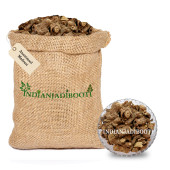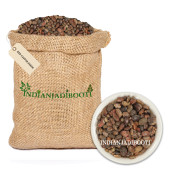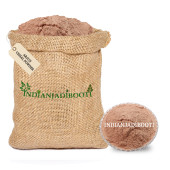Anjbar - Polygonum Viviparum - Alpine Bistort
1Availability: In Stock
Anjbar - Polygonum Viviparum - Alpine Bistort
Anjbar, also known as knotgrass, is a plant that is related to dock and buckwheat. Low grass, bird weed, pigweed, and prostrate knotweed are all names for this plant. It is an annual that grows in fields and wastelands and blooms with white flowers from June to October. It is prevalent in many temperate-zone countries, looks to be native to Eurasia and North America, and has naturalised in temperate Southern Hemisphere zones.
Knotgrass has low-lying, spreading stems that can reach a length of one metre. It is most easily identified as a little, slightly spinally spherical growth with white flowers and tiny leaves.
Anjbar is made from Beej Anjbar (Polygonum Bistorta), which has been used in the Unani Medical System for many years to cure digestive disorders, particularly diarrhoea. Tannins, a chemical component of Polygonum Bistorta, are beneficial in the treatment of diarrhoea as well as mouth and throat irritation. Sharbat Anjbar, in addition to being beneficial for dysenteric disorders, also serves as an anti-hemorrhagic and reduces bleeding. It aids in the control of heavy menstrual bleeding in menorrhagia. It can help patients with cholera, gastritis, and cystitis.
Knotgrass is a type of herb. The entire blossoming plant is used to make medication. Knotgrass is used to cure a variety of ailments in rural Asian medicine, including bronchitis, cough, lung disorders, skin conditions, tuberculosis-related decreased sweating, increased urine production, and gum, mouth, and throat redness, swelling, and bleeding. It is also used to block the flow of blood.
| Product Info | |
| Scientific Name: | |
| English Name: | |
| Part Used: | |
0% Customers recommend this product
Reviews Over Anjbar - Polygonum Viviparum - Alpine Bistort
Total Reviews (0)
Copyright 2018, IndianJadiBooti.in Disclaimer: The information given on the website has not been evaluated by FDA, or by us. This data is for basic information purpose only, and is not intended to make a diagnosis, cure, avert or treat any illness or disease. We strongly suggest visiting and consulting a qualified Ayurvedic Practitioner before starting or following any regime.







 Facebook
Facebook Instagram
Instagram Pinterest
Pinterest Twitter
Twitter
